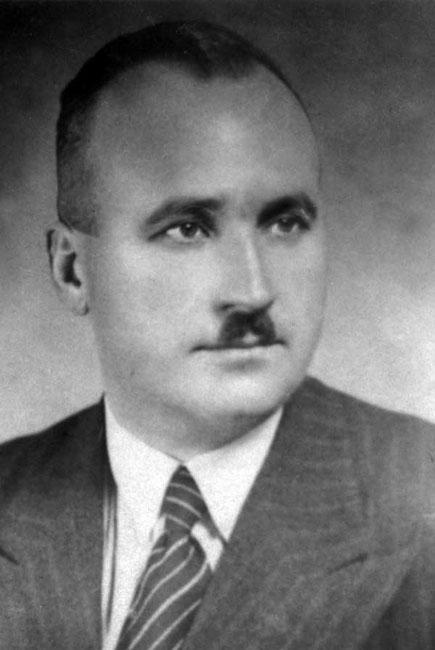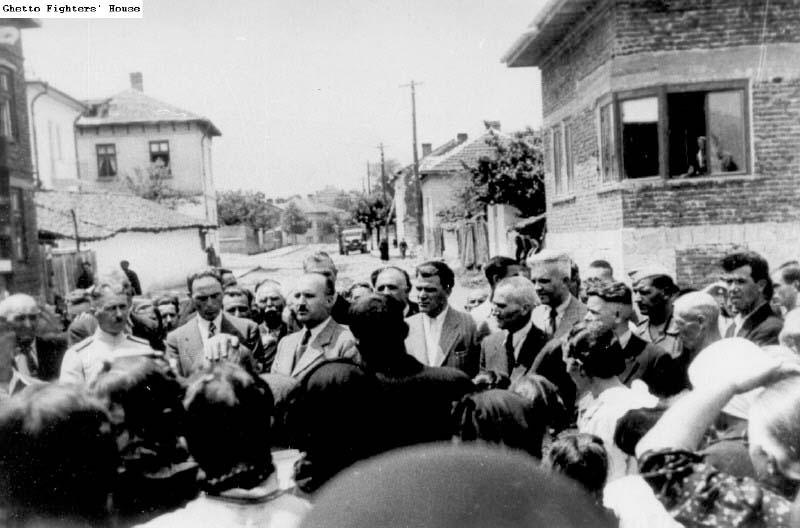Contesting the Deportations in Parliament
Like many other political figures in his country, Dimitar Peshev, the Vice President of the Sbranie - Bulgaria's Parliament – had favored Bulgaria's alliance with Germany. Germany rewarded its ally, and when Yugoslavia was divided between the Axis powers, Bulgaria regained the territories that it had lost in the Balkan war of 1912-3.
Peshev's party which was the government majority party enacted anti-Jewish legislation, such as the 1940 Law for the Defense of the Nation, which restricted Jews' participation in the country's economic and social life and imposed a special tax on Jews. In addition Jews were ordered to wear a Jewish star and male Jews were drafted for forced labor. The proposed bill produced mixed reactions. There was a certain support for the anti-Jewish measures, as well as protests by organizations such as the Bulgarian Writers Union and the Physicians Union. Peshev supported the bill, as he explained in his post war memoirs: 'I was of the firm conviction that all this was indeed about bringing Bulgaria's policies in line with those of Germany...No one imagined that the measures would become permanent, let alone that they would take the same forms and proportions as those that were being carried out in Germany'. Faced with the complexities of the political situation, Peshev believed that the price the Jews had to pay was justified as it was balanced against what Bulgaria was to gain. As it turned out, other German demands were to follow.
In February 1943 the Bulgarian government agreed to deport 20,000 Jewish from Thrace and Macedonia. However, since there were nowhere near 20,000 Jews in these provinces, it was agreed to make up the difference with 6,000 Jewish from Bulgaria itself. The first such group of Bulgarian Jews was to come from Kyustendil. When rumors about the intended deportations reached Peshev he acted promptly and traveled to Kyustendil. There he met with the assistant chief of police who told him about the planned roundups. He also received delegations of Jews and non-Jews who implored him to intervene. Peshev, who two years earlier had accepted the anti-Jewish measures as necessary, felt that he had reached a point where acquiescence was no longer an option. Rather than shut his eyes and continue to persuade himself that the alliance with Germany benefited Bulgaria, he confronted the consequences of this pact and decided that it was his responsibility to act. He organized a parliamentary delegation and went to see Petr Gabrovski, the Minister of Interior.
Peshev did not satisfy himself with the Minister's assurance. He decided to bring the matter to the parliament. On 17 March he wrote a letter of protest and had 42 parliamentarians sign it. He ignored the Prime Minister's request not to submit the letter, and it was discussed by the majority caucus in its meeting on 23 March 1943. The session turned into a confrontation between Peshev and the Prime Minister, who in order to intimidate the signatories of the petition, insisted on having each one of them stand up and announce their support of the letter. This caused some of them to falter. Under the Prime Minister's pressure, only 30 of the original 42 stood fast. As it turned out, the debate actually focused on the parliamentarians’ loyalty, not on the deportees’ fate.
In a final vote, the party declared its support of the Prime Minister and decided to censure Peshev. On March 30 he was forced to step down as the Parliament's vice president, and his request to be allowed to speak was rejected. Peshev was politically ostracized, but his protest was echoed by other political and clerical voices and the Bulgarian government had to abandon its plans to deport the Jews of Bulgaria. The deportations from Bulgaria were suspended, but while the political negotiations were going on, the Jews of Thrace and Macedonia were being deported by the Bulgarian authorities. The last transport to the death camps left on March 29, 1943.
In 1944, after Bulgaria came under Soviet control, Peshev was charged with anti-Semitism and collaboration with the Germans. He was sentenced to 15 years in prison, but was released after serving one year. He passed away in 1973.
In 1973 Peshev was awarded the title of Righteous Among the Nations by Yad Vashem.


